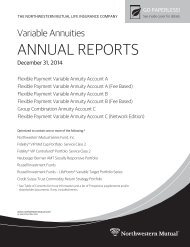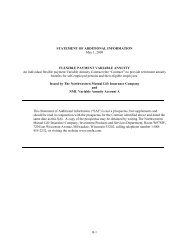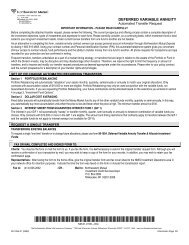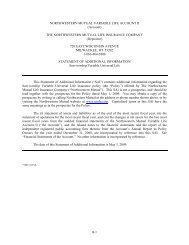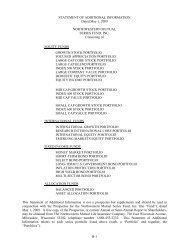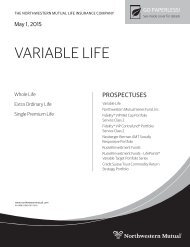egulations. The presence of an issuer or security on the restricted list of a Portfolio’s investment adviseror Sub-Adviser or certain of its corporate affiliates could impair the Portfolio’s ability to sell and buysecurities.Risk Factors for Foreign Securities, Foreign Currencies and Foreign Interest RatesForeign Securities Each Portfolio may invest in foreign securities, subject to the limitations of itsinvestment objective and strategies.There may be less publicly available information about foreign companies comparable to thereports and ratings published about companies in the U.S. Foreign companies are not generally subject touniform accounting or financial reporting standards, and auditing practices and requirements may not becomparable to those applicable to U.S. companies. The Portfolios, therefore, may encounter difficulty inobtaining market quotations for purposes of valuing their assets and calculating their net asset value.Foreign markets have substantially less volume than the New York Stock Exchange and securities ofsome foreign companies are less liquid and more volatile than securities of comparable U.S. companies.Commission rates in foreign countries, which are generally fixed rather than subject to negotiation as inthe U.S., are likely to be higher. In many foreign countries there is less government supervision andregulation of stock exchanges, brokers and listed companies than in the U.S. To the extent issuersdomiciled in the U.S. have extensive business markets or operations overseas, certain of these risk factorsmay also be present when investing in the securities of those U.S. issuers.Emerging markets Investments in companies domiciled in developing countries may be subject topotentially higher risks than investments in developed countries. These risks may be greater for someemerging market countries than others. Currently, emerging market countries include, for example,China, India and a number of countries in Eastern Europe, Latin America and Southeast Asia. These risksinclude (i) less social, political and economic stability; (ii) the small current size of the markets for suchsecurities and the currently low or nonexistent volume of trading, which result in a lack of liquidity and ingreater price volatility; (iii) certain national policies which may restrict each Portfolio’s investmentopportunities, including restrictions on investment in issuers or industries deemed sensitive to nationalinterests; (iv) foreign taxation; (v) the absence of developed legal structures governing private or foreigninvestment or allowing for judicial redress for injury to private property; (vi) the absence, until recently inmany developing countries, of a capital market structure or market-oriented economy; and (vii) thepossibility that recent favorable economic developments in some developing countries may be slowed orreversed by unanticipated political or social events in such countries.In addition, many countries in which the Portfolios may invest have experienced substantial, andin some periods extremely high, rates of inflation for many years. Inflation and rapid fluctuations ininflation rates have had and may continue to have negative effects on the economies and securitiesmarkets of certain countries. Moreover, the economies of some developing countries may differ favorablyor unfavorably from the U.S. economy in such respects as growth of gross domestic product, rate ofinflation, currency depreciation, capital reinvestment, resource self-sufficiency and balance of paymentsposition.Investments in developing countries may involve risks of nationalization, expropriation andconfiscatory taxation. For example, the Communist governments of a number of Eastern Europeancountries expropriated large amounts of private property in the past, in many cases without adequatecompensation, and there can be no assurance that such expropriation will not occur in the future. In theevent of expropriation, each Portfolio could lose a substantial portion of any investments it has made inthe affected countries. Further, no accounting standards exist in certain developing countries. Finally,even though the currencies of some developing countries, such as certain Eastern European countries,may be convertible into U.S. dollars, the conversion rates may be artificial to the actual market values andmay be adverse to the shareholders of a Portfolio.Currency Each Portfolio’s management endeavors to buy and sell foreign currencies on asfavorable a basis as practicable. Some price spread in currency exchange (to cover service charges) willB-42
e incurred, particularly when a Portfolio changes investments from one country to another or whenproceeds of the sale of shares in U.S. dollars are used for purchase of securities in foreign countries. Also,some countries may adopt policies which would prevent the Portfolios from transferring cash out of thecountry or withhold portions of interest and dividends at the source. There is the possibility of cessationof trading on national exchanges, expropriation, nationalization or confiscatory taxation, withholding andother foreign taxes on income or other amounts, foreign exchange controls (which may includesuspension of the ability to transfer currency from a given country), default in foreign governmentsecurities, political or social instability, or diplomatic developments which could affect investments insecurities of issuers in foreign nations.Each Portfolio may be affected either unfavorably or favorably by fluctuations in the relativerates of exchange between the currencies of different nations, by exchange control regulations and byindigenous economic and political developments. Further, certain currencies may not be internationallytraded. Some countries in which the Portfolios may invest may also have fixed or managed currencies thatare not free-floating against the U.S. dollar.Certain currencies may experience a steady devaluation relative to the U.S. dollar. Anydevaluations in the currencies in which a Portfolio’s securities are denominated may have a detrimentalimpact on that Portfolio. A Portfolio’s manager endeavors to follow a flexible policy seeking to avoidunfavorable consequences and to take advantage of favorable developments that may impact securitiesdenominated in foreign currencies. The exercise of this flexible policy may include decisions to buysecurities with substantial risk characteristics and other decisions such as changing the emphasis oninvestments from one nation to another and from one type of security to another. Some of these decisionsmay later prove profitable and others may not. No assurance can be given that profits, if any, will exceedlosses.Foreign interest rates To the extent each Portfolio invests in debt securities denominated in aparticular foreign currency, changes in interest rates in the domicile country of that currency will affectthe value of the assets so invested and, consequently, the Portfolio’s share price. Rising interest rates in aforeign country, which often occur during times of inflation or a growing economy, are likely to cause theface value of a debt security denominated in that country’s currency to decrease, having a negative effecton the value of the Portfolio’s shares. Of course, interest rates have increased and decreased, sometimesvery dramatically, in the past. These changes are likely to occur again in the future at unpredictable times.Fluctuations in foreign interest rates will not necessarily correspond with fluctuations in U.S. interestrates.Initial Public OfferingsEach Portfolio may participate in initial public offerings. A Portfolio that purchases securitiesissued in an IPO is subject to the risk that the value of the securities may rise or fall more rapidly thanother investments. Prior to an IPO, there is generally no public market for an issuer’s common stock.There can be no assurance that an active trading market will develop or be sustained following the IPO,therefore, the market price for the securities may be subject to significant fluctuations and a Portfolio maybe affected by such fluctuations. In addition, securities issued in an IPO are often issued by a companythat may be in the early stages of development with a history of little or no revenues and such companymay operate at a loss following the offering. A Portfolio’s ability to obtain shares of an IPO security maybe substantially limited in the event of high demand for the securities and there is no guarantee that thePortfolio will receive an allocation of shares. For IPO offerings in which the Adviser or Sub-Adviser of aPortfolio is offered a relatively small number of shares, a disproportionate number of such shares may beallocated to that Portfolio, in the Adviser’s or Sub-Adviser’s discretion. To the extent a Portfolio investsin IPOs, a significant portion of its returns may be attributable to its investments in IPOs, which have amagnified impact on Portfolios with small asset bases. There is no guarantee that as those Portfolios’assets grow they will continue to experience substantially similar performance by investing in IPOs.B-43
- Page 4: APPENDIX F - Proxy Voting Policies
- Page 9 and 10: stocks that make up that index. Str
- Page 11 and 12: Interest rate swaps do not involve
- Page 13 and 14: the Adviser or Sub-Adviser will not
- Page 17 and 18: Forward Contracts. The Portfolios m
- Page 19 and 20: principal amount as the call writte
- Page 21 and 22: Options on Foreign Currencies. The
- Page 23 and 24: securities. The issuers of the unde
- Page 25 and 26: the former pools. However, timely p
- Page 27 and 28: CMO residuals are generally purchas
- Page 29: utilize the underlying assets may r
- Page 32 and 33: include range floaters which are a
- Page 34 and 35: par unless the price of the underly
- Page 36 and 37: to changes in interest rates genera
- Page 38 and 39: corresponding floaters. The underly
- Page 40 and 41: A Portfolio will not enter into suc
- Page 44 and 45: Portfolio TurnoverPortfolio turnove
- Page 46 and 47: The ability of the Portfolio to ach
- Page 48 and 49: Advisors, LLC, in accordance with t
- Page 50 and 51: OWNERSHIP OF SHARES OF THE FUNDAll
- Page 52 and 53: on the next $50 million, 0.50% on t
- Page 54 and 55: Independent Registered Public Accou
- Page 56 and 57: Name of Portfolio 2008 2007 2006Int
- Page 58 and 59: Broker High Yield Bond BalancedAsse
- Page 60 and 61: and cost of trade execution of Port
- Page 62 and 63: Effective April 30, 2008, the Fund
- Page 64 and 65: TAXES AND DIVIDENDSEach Portfolio i
- Page 66 and 67: APPENDIX A - Credit RatingsDescript
- Page 68 and 69: F2Good credit quality. A satisfacto
- Page 70 and 71: . Moody’s Commercial Paper (short
- Page 72 and 73: Plus (+) or minus (-)The ratings fr
- Page 74 and 75: APPENDIX B - Directors and Officers
- Page 76 and 77: Name, Address, andYear of BirthDavi
- Page 78 and 79: APPENDIX C - Ownership of Shares of
- Page 80 and 81: SMALL CAP VALUE PORTFOLIOGeneral Ac
- Page 82 and 83: APPENDIX D - Portfolio ManagersOthe
- Page 84 and 85: PortfolioManager(s)FundRegisteredIn
- Page 86 and 87: Compensation of Portfolio ManagersM
- Page 88 and 89: management firms. Performance is pr
- Page 90 and 91: Portfolio managers are eligible for
- Page 92 and 93:
PortfolioPortfolio Manager(s)Dollar
- Page 94 and 95:
On August 25, 2005, the Court enter
- Page 96 and 97:
MSA’s Equity Trading Department s
- Page 98 and 99:
ERISA ClientsIn the case of client
- Page 100 and 101:
Shareholder Ability to Call Special
- Page 102 and 103:
• Exercise price• Participation
- Page 104 and 105:
Amend Quorum RequirementsVote propo
- Page 106 and 107:
Vote proposals to increase blank ch
- Page 108 and 109:
employees of Investment Manager and
- Page 110 and 111:
will not support the position of a
- Page 112 and 113:
company specifies the voting, divid
- Page 114 and 115:
egarding whether Investment Manager
- Page 116 and 117:
3. The issuer is an entity particip
- Page 118 and 119:
manager(s) are responsible for maki
- Page 120 and 121:
Global Corporate Governance: Invest
- Page 122 and 123:
13. The Proxy Group will review the
- Page 124 and 125:
determined by those investment comm
- Page 126 and 127:
T. Rowe Price has adopted these Pro
- Page 128 and 129:
shareholders and the effect on shar
- Page 130 and 131:
portfolio company could have influe
- Page 132 and 133:
The Proxy Voting Service will refer
- Page 134 and 135:
that substantially differs from dom
- Page 136 and 137:
15. Janus will generally vote in fa
- Page 138 and 139:
46. For shareholder proposals outsi
- Page 140 and 141:
2. Staggered BoardIf a company has
- Page 142 and 143:
proposed for a legitimate business
- Page 144 and 145:
APPENDIX G - Portfolio Holdings Dis
- Page 146:
ICP Securities LLCIntermonte Securi



